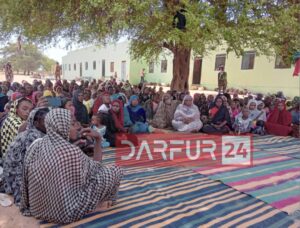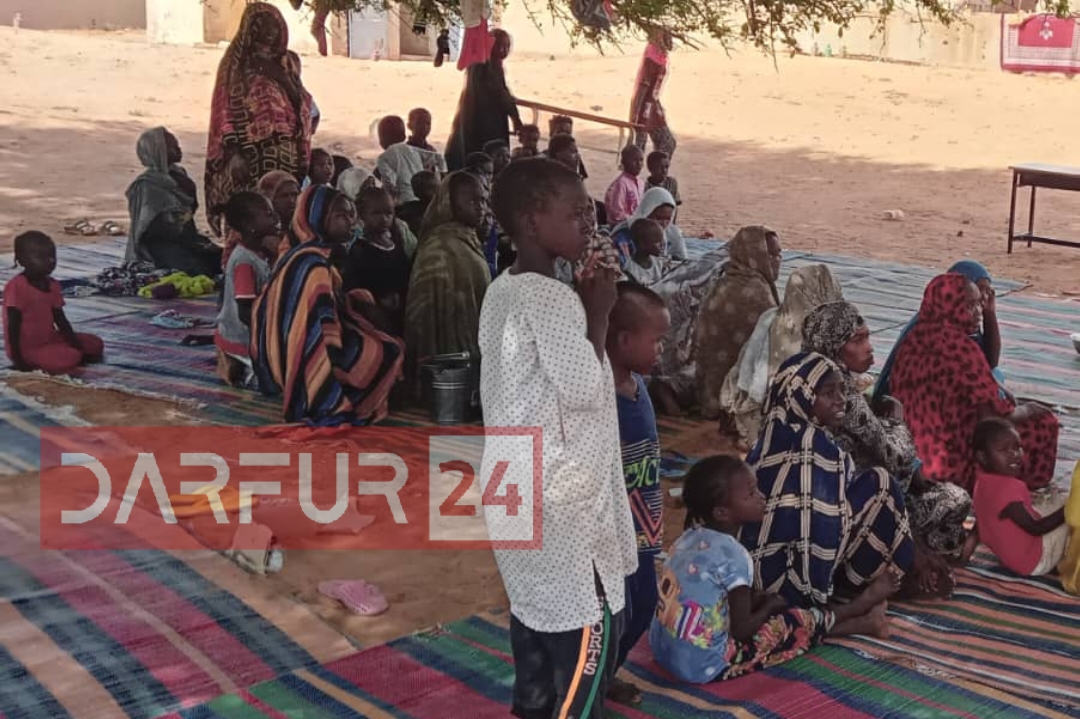El Fasher – Darfur 24
Zainab Muhammad Al-Hassan, 32 years old, was forced to leave her home in the Al-Wadi neighborhood in Nyala, the provincial capital of South Darfur State, like other thousands of residents who fled the hell of battles between the Sudanese army and the Rapid Support Forces RSFin the city.
Fighting between the two warring parties intensified since mid-August in a way that made life in the city risky, after hundreds of people were killed.
Hundreds of civilians have killed and thousands wounded as a result of the battles in which the Rapid Support Forces are trying to control the army Headquarters in the city.
Zainab and her family fled to the city of El Fasher, the capital of North Darfur state, which is witnessing relative stability. She found herself living in a shelter center at Al Redeef Primary School for Girls, sharing a classroom with four other families.
Most of those fleeing are women and children, the center houses dozens of families, most of whom are women and children, but they lack basic needs, so these families share limited toilets and bathrooms that lack the most basic elements of personal privacy.
Zeinab says that her family decided to leave the Al-Wadi neighborhood after the battles between the army and the Rapid Support Forces intensified and survival amidst their fire became impossible, In addition to gunmen called “Al-Kasaba,” who are the militias supporting the Rapid Support, stormed their house at dawn, pointed their weapons in their faces, and forced them to hand over their possessions. Gold and money.
Army headquarters’battle
During the last two weeks of August, the city of Nyala witnessed an increase in the pace of battles between the army and the Rapid Support Forces after the latter approached the Army headquarters of the 16th Infantry Division and was trying to control it, to include it with the rest of the army garrisons in the areas of Umm Dafouk on the border with Central Africa, Rahid Al-Bardi, Kass and Mershing, which they had captured last June.
As the Rapid Support Forces were trying to complete their grip over South Darfur, military sources said that they had brought to Nyala additional forces and armament commensurate with the military strength of the 16th Infantry Division base, which had remained impassable throughout the months of the war since last April.
The sources told Darfur 24 that preparations for the Army headquarters battle state arrival of vehicles from Several cities loaded with various types light weapons artillery, missiles, and drones.
The Rapid Support Forces, moved the battle to the vicinity of the 16th Infantry Division Command. They seized the guest house and the governor’s house, and reached as far as the Mecca Bridge and Nyala Stadium. It turned the city center and the neighborhoods of Al-Jumhuriya, Al-Cinema, Al-Wadi, Karari, and Al-Wahda into a heavy weapons battlefield, which increased the number of casualties in a way described as human massacres , a matter that forced thousands of residents to leave their homes.
Assassination of the 16th Infantry Division commander
Commander of the 16th Division, Major General Yasser Khadr, who was allegedly killed inside Army headquarters in nyala by his own soldiers accusing of siding with RSF.
According to the Nyala Emergency Room, the battles in the period from August 14 to 20 left more than 100 dead and 500 wounded, which is an inaccurate preliminary statistic at a time when it was expected that the numbers would be much higher than that, with the death toll exceeding 500 dead since the outbreak of the war according to unofficial statistics.
There are difficulties in conducting inventory operations due to the closure of hospitals and the interruption of communication networks in the city.
Dire humanitarian situation.
The conflict between the army and the Rapid Support forced in the city of Nyala left catastrophic conditions in all aspects, as it led to the cessation of most health institutions except for the Sudanese Turkish Hospital south of the city, which only works to receive cases of serious wounds, and in recent times the process of transporting the injured to it has become impossible except by carrying on shoulders or Buggy due to the danger of citizens moving in cars.
Searching for salvation
In light of this tragic situation, the city of El Fasher received more than 250 families last week, who were housed in temporary centers in Al-Radeef School for Boys and Girls, Al-Israa School, in addition to the Rufaida School Center, south of the city.
But even fleeing from the city of Nyala has also become fraught with difficulties and dangers. According to a number of those fleeing to El Fasher, they said that they took advantage of the buses from the “Al-Genena market, west of the city of Nyala, where there is a force from the armed struggle movements working to secure it and protect the residents who come to it to buy their needs. The cost of living is derived from the looting practiced by armed groups, at a time when the cost of travel tickets rose from 8,000 pounds at the outbreak of the war last April to 75,000 pounds, an amount that large numbers of families were unable to save to flee the city.
The Humanitarian Aid Commission in North Darfur says that dozens of families are still stranded between the cities of Nyala and El Fasher, and they are expected to arrive at shelter centers during this week.
Commissioner Abbas Yusuf Adam confirmed to Darfur 24 that there is no real assessment of the numbers of families who arrived in the city of El Fasher, and described their conditions in the centers as bad because organizations have not intervened to relieve them so far.
Humanitarian Aid Commissioner in North Darfur
Abbas said that the displaced people who have now been received at the centers are in dire need of water, health and food services, and at the same time he appealed to national and international organizations to intervene urgently and provide them with assistance.
He added: There are groups on their way to El Fasher, so we need the organizations’ interventions to prepare the environment and work to prepare the centers well to receive them.

Darfur 24 correspondent spoke with a number of displaced women, who said that the centers need more services, especially health services and the provision of medicines and food. “Sumaya Omar Muhammad” from the Masnaa neighborhood in Nyala stated that the center in which she settled lacked everything, even drinking water, noting that the organizations did not provide They have received no support so far, and she added, “We have nothing to eat except some that is provided by the charitable residents of the Redeyef neighborhood in El Fasher.”
“Saadia Younis” from Al-Rahman neighborhood, east of Nyala, described the health situation in the center as dire and revealed that there are a number of pregnant women who lack health care or even a place to shower, she added: “We need mosquito nets, sanitary tools, some primary health care, and providing food for children before they become malnourished.”

